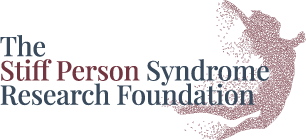Types of SPS
Stiff Person Syndrome (SPS) has been divided into different types. The differences are based on the clinical and physical manifestations. The causes and treatments of each type may differ. There are varying expert perspectives about the details of each type of SPS. With more research and more comprehensive understanding, it should be possible to more precisely define the different types of SPS.
Classic Stiff Person Syndrome
This is the most common type of SPS. Symptoms of classic SPS include muscle rigidity, stiffness, and spasms in muscles of the trunk, especially the back, and limbs. Initially this may be experienced as intermittent muscle rigidity. Muscle spasms vary greatly in intensity and duration, though often become worse over months or years. As a result of the muscle spasms, especially if there are continuous contractions in the back and abdominal muscles, some people develop an exaggerated sway back posture called lordosis.
Loud or sudden noises often exacerbate symptoms and, in some cases, can trigger intense full-body muscle spasms causing people to freeze like a statue and fall. This can result in injuries including concussions, broken bones and bruises, as well as anxiety and a fear of open spaces. People may become homebound and isolated. Walking may become more difficult. Emotional stress often makes symptoms worse. Living with chronic pain and decreased mobility may also lead to considerable psychological distress, and depression.
Focal Stiff Person Syndrome or Stiff Limb or Partial SPS
In some people with SPS, the muscle stiffness and spasms might only be in a limb, usually one leg, though it may be in both legs. There may also be leg jerking. Walking may become increasingly difficult. Eventually the trunk muscles may also become involved, similar to classic SPS symptoms.
Progressive Encephalomyelitis with Rigidity and Myoclonus (PERM)
This is a more severe form of SPS, usually associated with rapid deterioration. Encephalomyelitis means a disease which impacts the brain and spinal cord. This form of SPS may include jerky muscle contractions (myoclonus), abnormal eye and eyelid movements, seizures, cognitive and behavior changes, difficulty swallowing, along with problems regulating blood pressure, heart rate, and body temperature.
Paraneoplastic Stiff Person Syndrome
Paraneoplastic SPS is an even less common type of SPS, a rare form of a very rare disorder. Paraneoplastic describes autoimmune antibodies in association with tumors which may or may not be cancerous. Tumors associated with SPS include those of the thymus, colon, lung, breast, and ovary. Lymphomas, a cancer of the lymphatic system, have also rarely been associated with paraneoplastic SPS.
In paraneoplastic SPS, there is an increased chance of finding antibodies to either amphiphysin, a brain protein, or to glycine receptors, which are central nervous system receptors.
In both situations, antibodies to amphiphysin or to glycine receptors, when the underlying cancer is treated, the SPS symptoms often improve. To emphasize, most people with SPS do not have cancer associated with the SPS.
Stiff Person Syndrome with Cerebellar Ataxia
This type of Stiff Person Syndrome has an overlap with cerebellar ataxia, which indicates people have muscle incoordination. They may have ataxia with walking, and may have abnormal eye movements, persistent double vision, vertigo, and dizziness.
Disclaimer: The content of this Website is provided for informational and educational purposes only, and does not in any way intend to substitute for professional medical advice, diagnosis, or treatment. The content is not intended to be medical advice for any particular person or patient and should not be relied upon as medical advice. You should always seek the advice of a physician or other qualified healthcare provider for medical advice, including any questions you may have regarding diagnosis or treatment of any medical condition.
Contributors to this document include: Jim Weiss, MD; Vered Lewy-Weiss, MD; Tara Zier, DDS and SPS patient.
